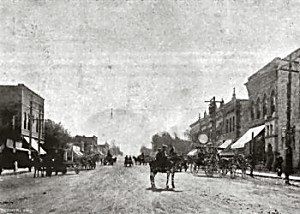In late March, 1902, our little town was the site of a lynching. Right here in La Junta, some four thousand men, women, and children came to witness and participate in the hanging and shooting of a black man accused of assaulting a white woman.
Reports, at the time, describe the sheriff–a Sheriff Farr–as doing everything in his power–up to a point–to prevent the lynching, even hiding the accused man in a buggy and attempting to race for Sugar City with him. The crowds ran him down.
 Upon return to La Junta, a small group of prominent citizens–Robert Patterson, banker; Dr. Fleming, hospital physician; Charles Dearbohn, and some others, asked the crowd, “Could we try to obtain a confession out of the accused?” The mob agreed, but soon discovered that they had been tricked. These prominent citizens had taken the accused into the courthouse to try to save the man’s life so he could stand trial.
Upon return to La Junta, a small group of prominent citizens–Robert Patterson, banker; Dr. Fleming, hospital physician; Charles Dearbohn, and some others, asked the crowd, “Could we try to obtain a confession out of the accused?” The mob agreed, but soon discovered that they had been tricked. These prominent citizens had taken the accused into the courthouse to try to save the man’s life so he could stand trial.
“When this was announced, the crowd began yelling and throwing stones. Battering rams were improvised, and the court house assaulted. Soon all the windows were broken and the doors of the county clerk’s and treasurer’s offices and the main entrance of the court house were broken down, and the mob rushed in at the door and windows.”
The mayor, Frederick Sabin, begged the crowd to allow the man due process. “Our town,” he declared, “will be disgraced.” But the crowd dragged the accused man out to the town square anyway, hung him from the tallest telegraph pole, and shot him multiple times.
Can you imagine it? The population of La Junta in 1900 was only a little over 2,500, so a crowd of 4,000? That was everybody in town, plus Rocky Ford and Swink, with likely some exaggeration to boot, but still it was a huge crowd.
It was a mob.
“Ochlocracy” is the fancy word for mob rule. No law, no elections, no reason, no due process, just action, usually quick, usually violent.
The Romans knew a little bit about ochlocracy. Ochlocracy had helped bring down the Roman Republic, and the Roman Empire that succeeded it was barely 60 years old when Jesus showed up on the scene. The Romans were terrified of mob justice because they knew what mob justice could do.
Those Jewish leaders, they knew it too. They were afraid of the mob too. Twice, the Gospel of Mark points it out:
“The chief priests and teachers of the law heard this (Jesus) and began looking for a way to kill him, for they feared him, because the whole crowd was amazed at his teaching.” (Mk 11:18)
And, a few verses later, in the trap they try to set for Jesus, again it’s acknowledged, “They feared the people” (Mk 11:32).
But what’s got the whole crowd riled up? Jesus has the whole crowd riled up.
Jesus, he’s been talkin’ ‘bout the end of the world. He’s been talkin’ ‘bout healing the sick, setting the captives free, and ‘bout a new empire, an empire of heaven, with God His Father on the throne. He’s been talkin’ ‘bout Himself as that God’s Son,the Messiah, and that’s got everybody worked up.
It’s too much, and they’re scared. And fear turns to anger, and anger turns to violence, and an innocent man dies.
I talk about it all the time. Fear brings out the worst in us. Fear makes us blind to the image of God in our neighbors, even the ones–especially the ones–with whom we disagree. Fear throws up walls. Fear stokes hatred. At the very least, fear makes us stupid. A great politician will stoke fear, because it’s just that powerful.
And yet here comes Jesus. Fear not, he preaches. Love your neighbors. Love your enemies. Turn the other cheek.
“My grace is sufficient for you,” he tells the apostle Paul, “for my power is made perfect in weakness” (2 Corinthians 12:9)
It’s the opposite of mob justice. It’s victory in fearlessness.
We’re getting closer to Easter, but let’s not pretend that we’re there yet. Moments of fairness and peace do happen, but they’re not the rule. Not yet. Fear can only be conquered by love, but the terror is still real at times. Stay here in these moments of Jesus’ suffering and death, trusting Him alone, for a few more hours, two more days.
And then feel the light. And then know the power.


